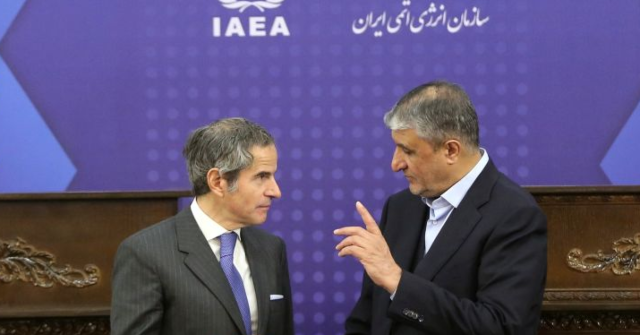The Islamic Republic of Iran enthusiastically condemned the International Atomic Energy Agency (IAEA), a United Nations oversight body, on Thursday for passing a resolution condemning Iran’s illicit nuclear development — and announced plans to build a new uranium enrichment facility.
The IAEA passed the resolution after its director-general, Rafael Grossi, issued remarks to its board on Monday accusing Iran of, among other transgressions, maintaining at last three secret nuclear facilities, which he claimed the regime tried to “sanitize,” a sign that it was attempting to avoid appropriate IAEA oversight.
The resolution passed on Thursday was the first in almost two decades to find Iran in violation of its nuclear obligations and explicitly stated that Iran had committed “many failures to uphold its obligations since 2019 to provide the agency with full and timely cooperation regarding undeclared nuclear material and activities at multiple undeclared locations.”
The resolution also precedes an anticipated sixth round of talks between Iranian and American officials, scheduled for Sunday, intended to result in an agreement on Iran’s nuclear development. Uranium enrichment is a major roadblock to the establishment of any such agreement. Multiple top officials in the administration of President Donald Trump, and Trump himself, have insisted that Washington would not sign any agreement that does not halt Iran’s uranium enrichment, currently believed to be occurring at a rate far beyond what is necessary for civilian nuclear development. Iranian officials, in contrast, have stated that the country continuing to enrich uranium was “non-negotiable” and that the main objective of any talks is to get the United States to lift sanctions on the rogue terror-sponsor regime.
While talks are, at press time, reportedly scheduled to continue, Iranian officials have increased their belligerent rhetoric following the various statements of serious concern from the IAEA. On Thursday, the Iranian Foreign Ministry and the Atomic Energy Organization of Iran (AEOI) issued a joint statement asserting that Tehran would not only reject calls to limit its enrichment, but build new facilities to accelerate the speed of that enrichment as soon as possible.
“The head of the Atomic Energy Organization has issued orders to establish a new uranium enrichment facility in a secure location and to replace first-generation centrifuges at the Fordow enrichment site with advanced IR-6 machines,” the state-run Islamic Republic News Agency (IRNA) reported, citing the statement.
The two entities dismissed the IAEA’s recent report, and the subsequent resolution expressing concern about Iran’s nuclear activities, as “entirely political and biased,” blaming America and several Western countries for pressuring the leaders of the organization to address the situation.
Iranian Foreign Minister Esmail Baqaei similarly condemned the IAEA as well as four countries — America, Britain, France, and Germany — for their participation in the U.N. agency. Beyond the effusive rejection in the joint statement, Baqaei threatened the parties involved with “appropriate measures” on Iran’s part to defy the IAEA.
“Despite these pressures, Baqaei said Iran has transformed the challenge into an opportunity by strengthening its domestic nuclear technology through the determination and ingenuity of its youth,” according to the regime-linked Tasnim News Agency.
The spokesman also took a moment to thank various rogue regimes who defended Iran at the United Nations, including Cuba, Belarus, China, and Russia.
Iran also deployed its U.N. representative, Saeed Iravani, to file a formal complaint with the U.N. Security Council, threatening further belligerent action from Tehran if the Council or any other United Nations entity used the IAEA’s findings and concerns as the basis for imposing more sanctions on the country. The letter was reportedly sent to the Council on Wednesday, prior to the IAEA resolution passing, and was a direct response to a letter presented by France, Britain, and Germany expressing concern regarding what is left of the 2015 Iran nuclear deal.
The deal, known formally as the Joint Comprehensive Plan of Action (JCPOA) failed due to Iran repeatedly violating it; while the United States withdrew from the agreement in 2018, several other parties remain signed onto it. The head of the IAEA Rafael Grossi, however, dismissed it last year, stating that it “exists only on paper and means nothing.”
Iravani accused the European powers of “attempting to shift blame and deflect attention from their own persistent and well-documented failures.” His letter insisted that there are no specific provisions in international law regarding uranium enrichment — which Grossi admitted on Monday, adding however that Iran’s rate of enrichment was alarming — and therefore, “as long as nuclear activities remain under IAEA safeguards and supervision, there is no legitimate cause for concern.”
“Importantly, there is no restriction on the level of enrichment itself; the critical limitation lies solely in preventing the diversion of nuclear material or activities toward non-peaceful purposes,” the envoy wrote.
The letter did not address the fact that Grossi accused Iran of hiding nuclear facilities from the IAEA.
“The true threat to international peace and security lies not in Iran’s peaceful nuclear activities, but in the continued resort to illegal and unilateral coercive actions in flagrant violation of international law and the UN Charter,” Iravani claimed, “the erosion of multilateralism and rule of law, and the instrumentalization of international organizations, in particular the IAEA, for a narrow political agenda.”
“Iran firmly warns that any attempt to reinstate the terminated provisions of the previous UNSC Resolutions would be a legally baseless and politically reckless act, with profoundly destabilizing consequences for regional and international peace and security,” he threatened.
Follow Frances Martel on Facebook and Twitter.
Read the full article here


